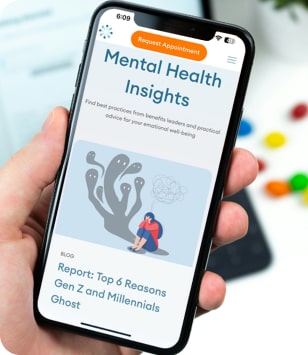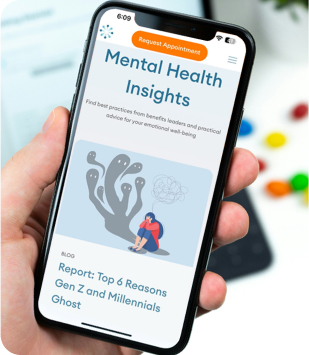How to Avoid Distractions at Work and Stay Focused

Emails, smartphones, calls, colleagues; the list goes on. It’s no surprise that so many people struggle with distractions and staying focused at work. Some days it can feel like you are constantly being interrupted. Between meetings and conversations, it’s tough to focus on your work and get through your to-do list.
While technology can increase productivity and give you access to tools that streamline your workday, it also has the opposite effect. More than half of employers say that workers’ mobile phones are to blame for decreased productivity at work. Often, distractions at work take up more time than you like to think. But the good news is that you can take steps to stop getting distracted at work and learn how to increase focus so that you can power through your day more effectively.
The Most Common Workplace Distractions that Kill Productivity
It’s easy to think that you jump straight back into what you were working on with complete focus when you’re interrupted during a task. But the research says different. A study from the University of California shows that, on average, it takes 23 minutes and 15 seconds to return to your original task after an interruption. You can see how all those minutes add up to a fair amount of lost productivity throughout the day. That email from a client or a quick question from a colleague shifts your focus and can put the brakes on productivity.
With an increasing number of people working remotely, there are even more distractions to handle. Children, family members, barking dogs, and a knock at the door are all hard to ignore. Attention distraction can lead to higher stress levels as well as lower mood and productivity. Unsurprisingly, all of this can impact the quality of work.
At work, the temptation of distraction is real. A report from CareerBuilder shows that the top workplace distractions are cell phones and texting. While it’s easy to place all the blame on technology, it’s clear other factors are at play, including:
- Meetings
- Emails
- Noisy co-workers
- Social media
- Gossip
- Calls on speakerphones
- Co-workers dropping by
10 Tips to Avoid Distractions at Work and Stay Focused
While employers are actively trying to find ways to limit distractions, some things you can’t avoid; meetings, emails, and calls are typically part of the job. So, how can you avoid distractions at work without switching off your phone and laptop altogether? Here are ten ways to stop getting distracted and increase your focus at work.
1. Organize and Make a Plan
It may sound a little obvious but start with a to-do list. Research shows that when you have a written plan of action, it increases productivity. The act of planning activities decreases the burden on the brain because it frees you from the worry of unfinished tasks. Organizing your day and making a plan is a good way to stay on track. Prioritize each task and glance at your list throughout the day if your mind begins to wander.
2. Limit Interruptions
While some interruptions are difficult to avoid, you do have control over others. One way to limit distractions and increase focus is to take a technology break so that you can focus on the task at hand. Give yourself a couple of minutes to check notifications, emails, and texts. Then try to have 15 minutes of uninterrupted time. This could be as simple as putting your phone on silent and turning it face down so that you can’t see any notifications.
3. Keep Personal Communication to Your Free Time
24% of workers admit that they spend at least one hour on personal calls, texts, and emails during a standard workday. When you’re in work hours, try to organize and designate the time to your to-do list. Of course, sometimes, you need to answer a personal call during the workday. But, in general, try to keep personal communication to your free time or lunch break.
4. Avoid Multitasking
It can make you feel superhuman, at times, to multitask as you complete several tasks in a shorter time. However, research shows that doing more than one task at a time, especially a complex one, impacts your productivity. Although multitasking may seem efficient on the surface, it tends to take longer and result in more errors.
5. Block Online Distractions
Social media, online shopping, and internet searching are all tempting. Most people use the internet for work purposes throughout the day, but it’s also very distracting. One way to block online distractions is by using focus apps and software. In the same way, you could turn off your phone notifications to limit interruptions; you can also block specific websites to fit around your work schedule. Apps like Freedom and Serene are great for blocking online distractions and allowing you to focus on your work.
6. Make Time for Breaks
Taking regular breaks can have a positive impact on focus and productivity. Instead of working without stopping, it’s more beneficial to take frequent breaks to feel refreshed. The most effective breaks are when you move, create, socialize, or nourish your body and mind. Research shows that the brain operates best when you switch between focus and unfocus.
7. Set Boundaries with Colleagues
Speaking to employees, colleagues, and business partners is crucial for building a collaborative and friendly work environment. But if you spend too much time gossiping or discussing non-work-related topics, it can do more damage than good.
Haley Selarnick, Licensed Marriage and Family Therapist in NYC, says that “boundaries are about what we allow and what we don’t allow in our lives. One thing I would suggest would be to take a look at where you’re exerting energy in your life and in what ways. Where are you exerting energy that leaves you feeling drained and pessimistic?” This is a great piece of advice that you could apply to multiple areas of your life. In the workplace, this could be setting boundaries for gossiping with colleagues or simply explaining that you’re too busy right now and suggesting a lunchtime catch-up.
8. Work in Time Blocks
Another tip for increasing focus and productivity is to work in time blocks. Timeboxing allocates a certain amount of time to a task. Timeboxing your calendar communicates with your team how busy you are, reminds you of the tasks you need to do, and serves as a reference for your time. Working in time blocks can give you a greater sense of control over your day.
Dr. Claire Nakajima, Doctoral Psychology Resident in NYC, recommends the “Pomodoro method or any kind of timer method where you commit to working for a certain amount of time even if it starts out small. Often, once you get started, you build up enough momentum to keep going past the time you had committed as long as you’re also making it hard to access what might distract you (phones, etc.).” The Pomodoro Technique focuses on working in 25-minute intervals and is a great place to start.
9. Shut the Office Door
While shutting the office door may be easier said than done for some of you, it can be useful. If you work in an open-plan office, you can skip past this tip. But if you work from home or have an office, shutting the door can be a helpful way of showing others that you’re busy. It can also shut out the noise that may be distracting you from your work.
10. Create an Email Schedule
Emails are one of the top culprits for workplace distractions, but they are also a key form of communication. One way to manage your emails is to batch-check emails. Set yourself time to go through your email inbox. This could be in the morning and then again in the afternoon. In the case of an emergency, you will likely receive an email alongside calls and texts. But if you’re in the middle of something, that email can wait 15 minutes so that you can finish your task.
Staying Focused at Work
If you struggle with workplace distractions, you are not alone. Digital distractions, emails, and chatting colleagues can destroy productivity and take minutes from your day. By taking small steps, you can feel more in control of your day, limit distractions, and improve your attention and focus at work. It’s challenging because, a lot of the time, you can’t ignore client emails and meetings for hours on end. But by creating a balance that allows you to focus on your day and avoid distractions, you can boost productivity in a way that works for you.
If you’re looking for counseling services near you, we can help you find the right therapist to support you on your journey. Whether you want to increase your focus and productivity at work, manage your anxiety, or lower work stress, our doctors are licensed to give you the support and help you need. We offer both in-person or online teletherapy appointments. Schedule a consultation with us today!

Signs Depression is Taking a Toll on Your Relationship
Depression can impact every part of a person’s life, from their work to their romantic relationships. Dealing with depression can take its toll on both the person with depression and the supporting partner. If you’re worried that depression is affecting your relationship, understanding its impact is an important first step.

Anxiety Attack and Panic Attack Differences
’s easy to mix up anxiety and panic attacks. While anxiety attacks and panic attacks do have overlapping symptoms, they are different. Let’s get into the differences between anxiety and panic attacks so you can be in a better position to get the help you need.

How to Overcome Procrastination and Anxiety
Procrastination is a very typical human experience. At some point or another, we’re all guilty of putting off that task we know is important. Maybe it’s household chores, filling your taxes, paying bills, or some other mind-numbingly boring task.

How to Build a Consistent Routine That Combats Depression
Depression can feel like a pit you can’t escape from, but know that depression is treatable with the right help. A basic daily ritual encourages healthy habits like a regular sleep schedule, healthy food choices, and exercise that support mental health.




